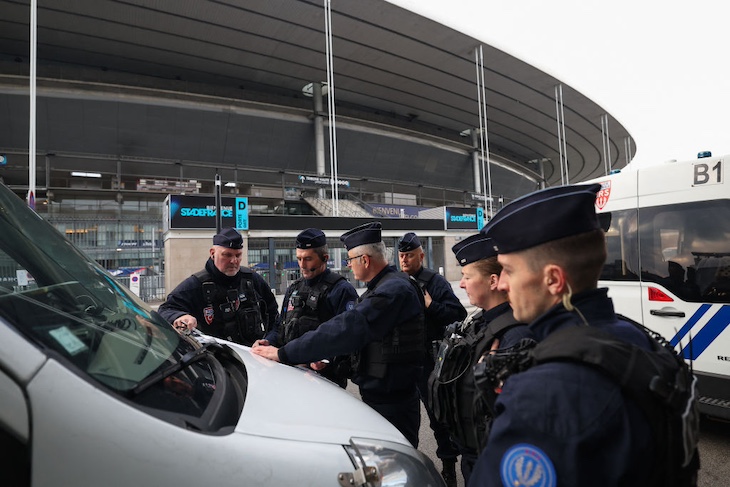France play Israel this evening in an international football match in Paris. The venue is the Stade de France although the French sports daily, L’Equipe, has said that the stadium has been transformed into ‘a bunker’. And so it should. These are dangerous times for Jews in Europe.
Last week dozens of Israeli football fans were attacked in a series of co-ordinated ambushes in Amsterdam by what the Dutch authorities described as ‘antisemitic hit-and-run squads’. Many of the assailants referenced the conflict in Palestine as they kicked and punched their victims. The King of Holland Willem-Alexander deplored the scenes and said that ‘our history has taught us how intimidation goes from bad to worse’.
Israel has advised its fans not to travel to the match, and many French supporters have been put off by the prospect of disorder
There was less sympathy from some left-wing politicians in France. One MP from La France Insoumise, Marie Mesmeur, said the fans weren’t attacked ‘because they were Jews, but because they were racists and supported genocide’.
Some in France had called for tonight’s match to be moved to a less volatile venue, as Belgium did in September when they relocated their game against Israel to Hungary. The Belgian authorities decided that it was ‘impossible to organise this very high-risk match’ in their own country given tensions among some of its citizens surrounding the conflict in Gaza.
France’s Interior Minister, Bruno Retailleau, this week declared that moving the match to a neutral location was never considered. ‘France doesn’t back down,’ he said. ‘France, the Republic doesn’t submit, especially to hatemongers’. He also urged Israel fans to attend the match, assuring them of their safety.
In a sense Paris is the safest European city for the Israeli football team. It hosted the summer Olympics in July and on that occasion the Israeli Olympic team, including its footballers, received round-the-clock protection from an elite military unit.
As well as the close protection unit travelling with the Israeli squad to and from the Stade de France this evening, there will be 4,000 police officers on duty inside and outside the stadium. There will also be 1,600 stewards deployed for the match.
Emmanuel Macron and his prime minister, Michel Barnier, will be present in the stand to cheer on the French team, as will former presidents Nicolas Sarkozy and Francois Hollande. But for those without VIP protection, the match is less appealing and it’s expected that only 20,000 of the stadium’s 80,000 seats will be occupied.
Israel has advised its fans not to travel to the match, and many French supporters have been put off by the prospect of disorder. In truth, no one much likes travelling to the Stade de France at the best of times; as Liverpool and Real Madrid fans discovered in 2022, when they attended the Champions League final at the venue. Many were mugged and sexually assaulted outside the ground, not, as the French government claimed in the immediate aftermath, by English fans, but by locals and the inhabitants of a nearby migrant camp.
Back in the day, the French football and rugby teams played their matches at the Parc des Princes, in the swanky 16th arrondissement, not far from Roland Garros. But a new stadium was built for the 1998 World Cup and it was sited in Seine-Saint-Denis, which from a Jewish fan’s perspective was the worst possible location.
The department was once home to a thriving Jewish community, but more than 50,000 have fled this century. The exodus was first identified in 2014 when a television documentary revealed that there was no longer any Jewish pupils in the state schools of Seine-Saint-Denis.
The political class was shocked, but what did they do about it? Nothing. Nor did they in 2018 when they learned that anti-Semitic acts had soared by 74 per cent across France.
Anti-Semitism is now out of control in France, as Bruno Retailleau explained in an interview on Tuesday evening. ‘I’m going to quote you a terrifying figure,’ he told viewers. ‘Our Jewish compatriots make up less than 1 per cent of the French population, yet they are the victims of 57 per cent of all acts of anti-religious hatred.’
Emmanuel Macron finds this statistic ‘inexplicable’, but others in France are more honest.
The distinguished Jewish writer and philosopher Alain Finkielkraut is one. ‘The two most frequent insults in the lost territories of the Republic… the territories conquered by Islamism, are: “Dirty Jew!” and “Dirty Frenchman!”’, he said in an interview last November. Finkielkraut was talking shortly after a video went viral of a group of teenagers on a Paris metro singing ‘F**k the Jews, Long live Palestine, we are Nazis and proud’. Those singing also sang of their pride in hailing from the ‘93rd’, which is the postal code of Seine-Saint-Denis.
Ten years ago, in the summer of 2014, Finkielkraut warned of the rising tide of anti-Semitism in France after violent scenes in Paris during a six-week war between Hamas and Israel. ‘In the name of the fight against Islamophobia, we systematically underestimate the hatred to which Jews and France are subjected,’ he said.
Who can blame French Jews from keeping away from the Stade de France this evening? Quite what Macron hopes his presence will achieve is unclear. His country’s Jews would have been more appreciative if he had attended last year’s rally in Paris against anti-Semitism. But he was scared off, anxious not to enflame tensions in the ‘lost territories’ of the Republic.
France will probably win this evening, but frankly who cares when the beautiful game has to be played in a bunker. This is the reality in France and Europe today: Jews, once more, are not safe.








Comments